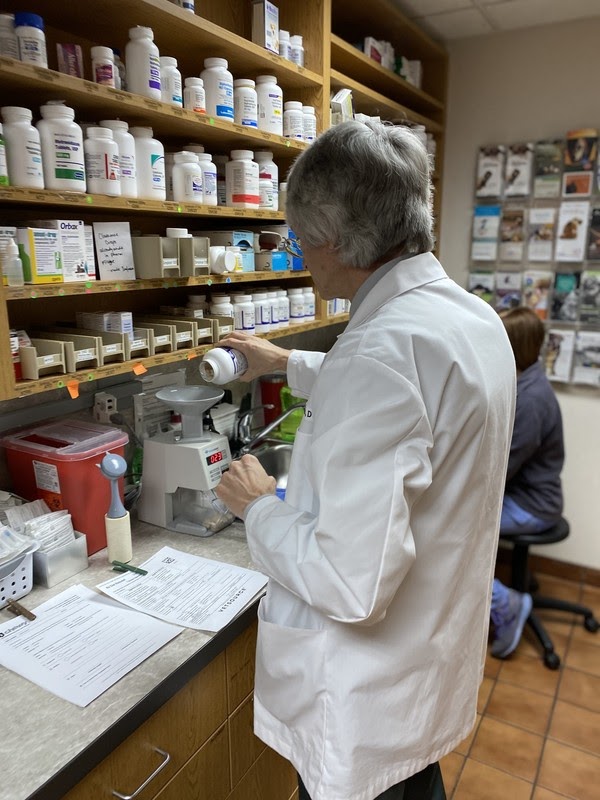
New law allows Michigan vets to discuss CBD with clients
Until a state law that passed on Dec. 31, 2020, Michigan veterinarians were not legally permitted to consult with their clients about the use of hemp-derived products, such as cannabidiol (CBD), for their pets. "We were in a murky legal state," said Dr. Steven McBride, "because we weren't technically allowed to discuss CBD with our clients. So if they wanted to try it for their pets, they felt they had to do it without us knowing."
Now, however, thanks to House Bill 5085, signed into law on December 31 by Gov. Whitmer, veterinarians may freely advise their clients about giving pets cannabis treatments, including CBD.
 Dr. McBride in the CHFA pharmacy. Veterinarians in Michigan can now discuss CBD with clients, although they are unable to prescribe them.“Owners have been giving their pets CBD as treatment for conditions such as seizures, anxiety, pain, and nausea. These are the same conditions it is used to treat in humans,” said Dr. McBride. “Now that we are able to consult, we can tell them what we know, which isn’t as much as we’d like. Our knowledge is limited on CBD’s benefits and potential hazards because there isn’t a lot of research out there for use of these products on pets. There are no really well done studies on the use of CBD in humans and even less in pets. A lot of what we’ve learned is anecdotal.”
Dr. McBride in the CHFA pharmacy. Veterinarians in Michigan can now discuss CBD with clients, although they are unable to prescribe them.“Owners have been giving their pets CBD as treatment for conditions such as seizures, anxiety, pain, and nausea. These are the same conditions it is used to treat in humans,” said Dr. McBride. “Now that we are able to consult, we can tell them what we know, which isn’t as much as we’d like. Our knowledge is limited on CBD’s benefits and potential hazards because there isn’t a lot of research out there for use of these products on pets. There are no really well done studies on the use of CBD in humans and even less in pets. A lot of what we’ve learned is anecdotal.”
Still, being able to discuss such alternative treatments means clients can feel more comfortable sharing with their veterinarians that they’re pursuing CBD for their pets. “There is some literature that suggests CBD might have an effect on liver enzymes, for example, so knowing that our patients have been taking CBD means we would monitor their liver enzymes,” said Dr. McBride. “Plus, when we know our patients have been taking CBD, we can look for potential interference with other medications they might be taking.”
“I’d tell a client who was using CBD or looking at using CBD as treatment to do their research,” said Dr. McBride. “We can’t prescribe the CBD to them but we can guide them. CBD is unregulated, and that means some products on the market might not have any CBD in them at all, or might contain toxic levels of heavy metals or pesticides. The manufacturers of the products you choose should be able to provide you with an analysis of the content, and tell you how to safely store the product and for how long.”
Ultimately, says Dr. McBride, the new law allows vets to take an even more active role in pets’ treatments. “We can hopefully steer clients in the right direction so they make the right choices for their pets.”



